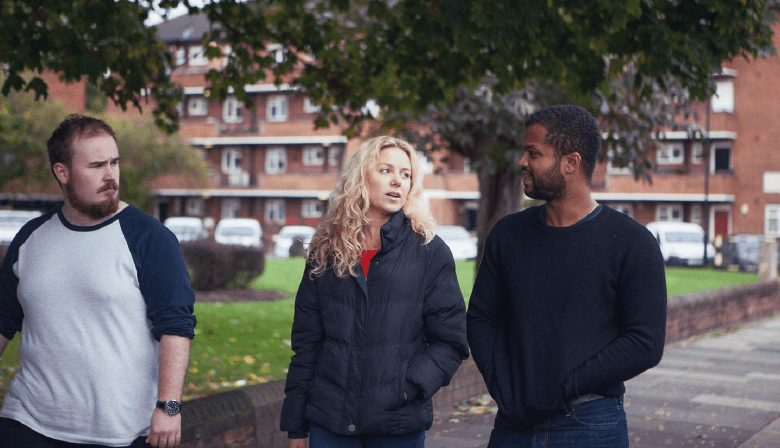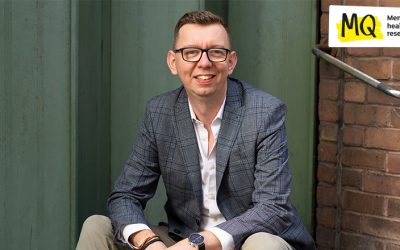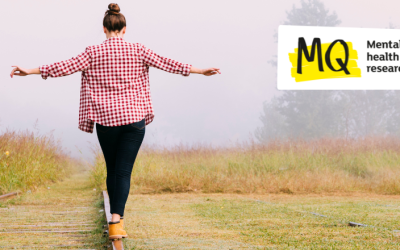[Content warning: This blog references violence, suicide and self harm]
We reached out to our Momentus givers to share their mental health stories with us, and talk about why mental health research matters to them. Our Momentus givers are generous people who donate monthly to support life-saving mental health research. We simply can't do what we do without their generosity. Here’s what they had to say:
"Staying mentally healthy requires constant vigilance and attention."
Barry, an MQ supporter shares his experiences living with anxiety, depression, addiction and ADHD:
”I have had lots of issues with mental health, including anxiety, depression and issues with overeating and addiction. I suspect many of these issues are borne of a number of adverse childhood experiences (both parents alcoholic, dad violent, mum verbally and emotionally abusive, running away from home on a particularly bad night). I was diagnosed with ADHD as an adult, so this likely also played a role.
"I have done lots of therapy and have been an inpatient at a mental health hospital on two occasions for about four weeks each time. Staying mentally healthy requires constant vigilance and attention.
“I am especially interested in the relationship between ACEs [adverse childhood experiences] and later mental health events in adulthood and what role, if any, compensating nurturing relationships play in mitigation.”
------
"The work that MQ and other research organisations do is laying the foundation for the future of sustainable mental health."
Daniel, another regular support of MQ's work, has lived with mental health problems since he was a teenager:
“My issues carved out so much of my life that it's impossible to really pinpoint a start or cause, just the moments when the problems eclipsed everything else. I went to an all boys school and one area that was not well explored was mental health - despite the terrifying scale of problems with young teens, especially men. It led to me seeing those parts of me as a failure on my part, as something which I should hide away, as something to be ashamed of. If I was going to be a man then I needed to get over myself. It wasn't until I had left for University and could really look at myself; the scars of self-harm and the misplaced shame of two suicide attempts that I spoke to a professional and began to learn.
“I was diagnosed with severe depression and anxiety. For these I was medicated and given access to a learning and therapy system. Over time I learnt more and more about these afflictions, treatments, and the stories of people around me who suffered like I did. It took a long time to realise that I wasn't alone. So many others suffered and it makes my blood run cold to think about all the people who never made it to adulthood. It was this that led me to MQ.
“I haven't self-harmed or attempted to take my life in a long time. I'm hesitant to say it'll never happen again, but I'm beginning to hope again. My friends and family pulled me back from the brink, but the sustainable happiness and resilience against the dark that I've built has come from learning.
“Had the data been there when I was younger, had the issue been pressed and the systems that surround us taken a closer look, then a lot of pain and suffering could have been avoided. Not just for the living, by maybe the shine of those who didn't make it would still be with us.
“The work that MQ and other research organisations do is laying the foundation for the future of sustainable mental health.Today I work in education, I love my job, I love my coworkers, and I love my family. I still have dark patches but the good will-out in the end. I've managed to enact a few shifts in our mental health awareness. With any luck the future will be brighter in the end."
"If I was told that things would get better when I was at my worst, I would have laughed it off. But speaking from experience from being in the dark, lonely place, things will get better."
-------
Ayla, a Momentus supporter of MQ struggled with her mental health and fainting attacks in her late teens. She survived an abusive relationship, and became pregnant with her first child:
“After I had my son, things began to look better but with one thing another, I was slowly being pushed away from my family and friends and eventually, I felt alone. I broke free from this relationship when my son was just 9 months old, but unfortunately the control was still there and I was getting worse mentally by the day. I was so low, I felt like I didn't have anyone to turn to and on top of all that, I was a young mum trying my best to be OK for my boy. I love my son to bits, and this love has got me through so much in my life, I'm so grateful for him!
"A couple of months after my break-up, my fainting attacks seemed to come back and they were worse than before. We couldn't get a diagnosis for 2 years and during this time, I was so frightened of thinking what was wrong with me. I was diagnosed with high anxiety and Psychogenic Drop Attacks. I was always told this was caused through trauma, which I later also got diagnosed with having PTSD.
"I have gone through a lot since this first diagnosis. Since then I am in a happy relationship with such a kind and supportive man, I have another baby and my son is as happy as ever.
"When I was in my darkest moments, I felt alone, I asked myself what I had done to deserve this, I was confused at why I felt so bad about myself. Having my son was my life saver. I can say now, with no shame and lots of confidence, that at my lowest point I wanted to die, without killing myself. I've learnt that that is OK! I could never leave my family, and at that time, my son was my focus.
"I have now been diagnosed with FND [Functional Neurological Disorder]. This is caused through going through trauma and can have such a varied amount of symptoms. I'm currently in a wheelchair due to my left leg being paralysed. This was caused by having a cluster of seizures, which is a symptom of my FND.
"Although I still struggle, I have learned that it's OK to have bad days. It's OK to feel the things people are told not to feel. I'm very lucky in the sense that I have a very supportive family. If my story can help anyone, then I would be over the moon. If I was told that things would get better when I was at my worst, I would have laughed it off. But speaking from experience from being in the dark, lonely place, things will get better.”
Thank you to our Momentus supporters who have shared their mental health stories with us. We appreciate your honesty and hope your stories inspire others.
Our Momentus givers support life-changing mental health research through a regular gift to MQ Mental Health Research. Sign up to a regular gift to MQ and you will receive an exclusive quarterly newsletter, and will be the first to know about upcoming events and webinars.



